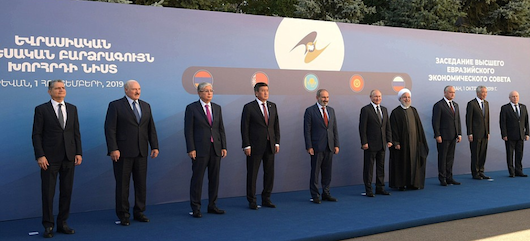Security Services: Moscow's Fifth Column Across Eurasia
One of the main tools of Russian influence across Central Asia remains poorly understood.
S. Frederick Starr and Svante E. Cornell
The Diplomat, January 17, 2020
Since Vladimir Putin came to power twenty years ago, much ink has been spent detailing the role of the security services in Russian politics, and it is generally accepted that the Putin regime essentially is a result of the Soviet-era KGB's takeover of the Russian state. But few have connected this to Russian foreign policy in its neighborhood. Meanwhile, many observers have puzzled over the reluctance of former Soviet states to embrace political reform or liberalization. Many have connected this to Russia's active opposition to greater openness and political participation in neighboring states. But few have ventured into specifics – how does Russia make its influence felt? Who is the "enforcer" with the power and resolve to translate Moscow's words into action?
Greater Eurasia: Russia's Asian Fantasy

S. Frederick Starr
Kennan Cable No. 46, January 15, 2020
Is there a grand strategy that informs Russia’s activities abroad and, if so, what is it? For years it seemed that President Putin based his foreign policy mainly on his 2005 statement to the Russian nation that the collapse of the Soviet empire “was the greatest geopolitical catastrophe of the century.” The task of Russian policy was therefore to reclaim by whatever means necessary as much control over former Soviet territories as possible. This led to his seizure of Georgian territory in 2008, his Crimean grab of 2014, and his armed incursions into eastern Ukraine in 2014-2019. More recently, it has led to his forcing Kyrgyzstan to join his politics-driven Eurasian Economic Union and his current bullying of Uzbekistan and Tajikistan to follow suit.
In practice, Russia’s foreign moves in places as diverse as Eastern Europe, Syria, and Africa seem to be guided more by opportunism than strategy. This has not sat well with some members of Moscow’s policy-oriented intelligentsia. Modern Russia, after all, is heir to a half millennium of messianic ideologies that justified and encouraged the expansion of territories under Moscow’s rule. Whether building the Third Rome, destroying the Tatars, placing the Cross of St. Vladimir atop the Hagia Sofia in Constantinople, building a Holy Alliance against future Napoleons, protecting Europe against revolution in 1848, conquering Muslim Central Asia in the 1860s, or aspiring to Sovietize Eastern Europe under Stalin, ideas, not mere opportunism, have driven Russia’s actions abroad. Even as Putin repeated his assertion about the collapse of the USSR, a deficit of theory was forming in Moscow’s foreign policy circles.
Image via Kennan Cable No. 46: Greater Eurasia: Russia's Asian Fantasy
America Must Defend Its Allies Against Clear Russian Hostility
Mamuka Tsereteli
The Hill, December 10, 2019
It is in American interests to deter an increasingly assertive Russia. One way of doing this is to strengthen the independence and sovereignty of the countries around Russia, most of which face growing pressure from Moscow. The Black Sea states of Ukraine and Georgia, as well as Moldova and Belarus, are primary targets of Russian power. Other countries of the South Caucasus and Central Asia also face assertive Russian policies. All these nations have suffered the collateral damage of changing ideologies of various administrations in the United States. American disengagement from different parts of the world over the last decade has created a large geopolitical vacuum now filled by Russia, China, and other adversaries.
Is This Central Asia’s ASEAN Moment?
On November 29, Central Asia re-emerged as a world region.
S. Frederick Starr
The Diplomat, December 5, 2019
Hats off to President Shavkat Mirziyoyev of Uzbekistan, First President Nursultan Nazarbayev of Kazakhstan, President Emomali Rahmon of Tajikistan, President Gurbanguly Berdymukhammedov of Turkmenistan, and President Sooronbay Jeenbekov of the Kyrgyz Republic. On November 29, 2019 these leaders jointly resolved to develop:
forms and mechanisms for the development of cooperation in the areas of trade, economy, investments, transport and transit, agriculture, industrial cooperation, protection of environment, energy, water resources, tourism, science and culture.
In short, they pledged to develop in Central Asia something akin to ASEAN, the Nordic Council, the Vishegrad Group, or Mercosur. After centuries of being played against one another, the Central Asian states have linked arms to advance their common welfare.
America and the Kurds
Real Clear Defense
December 3, 2019
John Bednarek and Svante E. Cornell
Much of the outrage and frustration for the U.S. withdrawal from Syria focused on America’s long-standing relationship with the Kurds, without differentiating between Kurdish groups. While America’s relations with Syria’s Kurds are in flux, as a matter of foreign policy, America should increase its support for the Kurds of Iraq, a clear and reliable long-term partner in this historically contested region.

